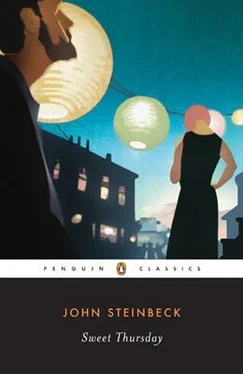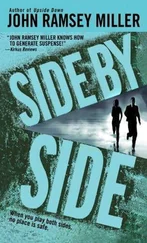John Steinbeck - Sweet Thursday
Здесь есть возможность читать онлайн «John Steinbeck - Sweet Thursday» весь текст электронной книги совершенно бесплатно (целиком полную версию без сокращений). В некоторых случаях можно слушать аудио, скачать через торрент в формате fb2 и присутствует краткое содержание. Год выпуска: 2008, ISBN: 2008, Издательство: Penguin Classics, Жанр: Классическая проза, на английском языке. Описание произведения, (предисловие) а так же отзывы посетителей доступны на портале библиотеки ЛибКат.
- Название:Sweet Thursday
- Автор:
- Издательство:Penguin Classics
- Жанр:
- Год:2008
- ISBN:1-4362-4126-X
- Рейтинг книги:5 / 5. Голосов: 1
-
Избранное:Добавить в избранное
- Отзывы:
-
Ваша оценка:
- 100
- 1
- 2
- 3
- 4
- 5
Sweet Thursday: краткое содержание, описание и аннотация
Предлагаем к чтению аннотацию, описание, краткое содержание или предисловие (зависит от того, что написал сам автор книги «Sweet Thursday»). Если вы не нашли необходимую информацию о книге — напишите в комментариях, мы постараемся отыскать её.
Cannery Row
Sweet Thursday — читать онлайн бесплатно полную книгу (весь текст) целиком
Ниже представлен текст книги, разбитый по страницам. Система сохранения места последней прочитанной страницы, позволяет с удобством читать онлайн бесплатно книгу «Sweet Thursday», без необходимости каждый раз заново искать на чём Вы остановились. Поставьте закладку, и сможете в любой момент перейти на страницу, на которой закончили чтение.
Интервал:
Закладка:
“Doc, how’s about you and me stepping over and getting a half-pint of Old Tennis Shoes?”
“Fine,” said Doc.
“I’ll buy,” said Mack. “I’ve got a couple of loose bucks.”
Doc said sharply, “I’ll have to get some money. Where can I get some money, Mack?”
“I told you, I’ll buy, Doc.”
“I’ll need a wide-angle binocularscope and light. I’ll have to find out about light—maybe a pinpoint spot from across the room. No, they’d move out of that. Maybe there are new kinds of lights. I’ll have to look into it.”
“Come on, Doc.”
Doc bought a pint of Old Tennis Shoes and later sent Mack out with money to buy another pint. The two of them sat in the laboratory side by side, staring into the aquarium, resting their elbows on the shelf, and they got to the point where they were mixing a little water with the whisky.
“I got an uncle with an eye like them,” said Mack. “Rich old bastard too. I wonder why, when you get rich, you get a cold eye.”
“Self-protection,” said Doc solemnly. “Conditioned by relatives, I guess.”
“Like I was saying, Doc. Everybody in the Row is worried about you. You don’t have no fun. You wander around like you was lost.”
“I guess it’s reorientation,” said Doc.
“Well, some people think you need a dame to kind of nudge you out of it. I know a guy that every time he gets feeling low he goes back to his wife. Makes him appreciate what he had. He goes away again and feels just fine.”
“Shock therapy,” said Doc. “I’m all right, Mack. Don’t let anybody give me a wife though—don’t let them give me a wife! I guess a man needs a direction. That’s what I’ve been needing. You can only go in circles so long.”
“I kind of like it that way,” said Mack.
“I’m going to call my paper ‘Symptoms in Some Cephalopods Approximating Apoplexy.’ ”
“Great God Almighty!” said Mack.
4
There Would Be No Game
As he got to know him, Joseph and Mary regarded Doc with something akin to love—for love feeds on the unknown and unknowable. Doc’s honesty was exotic to Joseph and Mary. He found it strange. It attracted him in spite of the fact that he could not understand it. He felt that there was something he had missed, though he could not figure what it was.
One day, sitting in Western Biological, Joseph and Mary saw a chess board and, finding that it was a game and being good at games, he asked Doc to teach him. J and M easily absorbed the characters and qualities of castles and bishops and knights and royalty and pawns. During the first game Doc was called to the telephone, and when he returned he said, “You’ve moved a pawn of mine and your queen and knight.”
“How’d you know?” the Patrón asked.
“I know the game,” said Doc. “Look, Joseph and Mary, chess is possibly the only game in the world in which it is impossible to cheat.”
Joseph and Mary inspected this statement with amazement. “Why not?” he demanded.
“If it were possible to cheat there would be no game,” said Doc.
J and M carried this away with him. It bothered him at night. He looked at it from all angles. And he went back to ask more about it. He was charmed with the idea, but he couldn’t understand it.
Doc explained patiently, “Both players know exactly the same things. The game is played in the mind.”
“I don’t get it.”
“Well, look! You can’t cheat in mathematics or poetry or music because they’re based on truth. Untruth or cheating is just foreign, it has no place. You can’t cheat in arithmetic.”
Joseph and Mary shook his head. “I don’t get it,” he said.
It was a shocking conception, and he was drawn to it because, in a way, its outrageousness seemed to him like a new, strange way of cheating. In the back of his mind an idea stirred. Suppose you took honesty and made a racket of it—it might be the toughest of all to break. It was so new to him that his mind recoiled from it, but still it wouldn’t let him alone. His eyes narrowed. “Maybe he’s worked out a system,” he said to himself.
5
Enter Suzy
It is popular to picture a small-town constable as dumb and clumsy. In the books he plays the stock bumpkin part. And people retain this attitude even when they know it’s not true. We have so many beliefs we know are not true.
A constable, if he has served for a few years, knows more about his town than anyone else and on all levels. He is aware of the delicate political balance between mayor and councilmen, Fire Department and insurance companies. He knows why Mrs. Geltham is giving a big party and who is likely to be there. Usually he knows, when Mabel Andrews reports a burglar, whether it is a rat in the dining room, a burglar, or just wishful thinking. A constable knows that Mr. Geltham is sleeping with the schoolteacher and how often. He knows when high-school boys have switched from gin to marijuana. He is aware of every ripple on the town’s surface. If there is a crime the constable usually knows who didn’t do it and often who did. With a good constable on duty a hundred things don’t happen that might. Sometimes there’s a short discussion in an alley; sometimes a telephone call; sometimes only his shadow under a street light. When he gets a cat down out of a tree he knows all about the owner of the cat. And many weeping, parent-prodded little boys and girls put small things, stolen from the Five-and-Dime, in the constable’s hands, and he, if he is a good constable, gives them a sense of mercy-in-justice without injuring the dignity of the law.
A stranger getting off the Del Monte Express in Monterey wouldn’t be aware that his arrival was noted, but if something happened that night he would know it all right.
Monterey’s Joe Blaikey was a good constable. He wouldn’t ever be chief—didn’t much want to be. Everybody in town liked Joe and trusted him. He was the only man in town who could stop a husband-and-wife fight. He came by his techniques in both social life and in violence from being the youngest of fifteen nice but violent children. Just getting along at home had been his teacher. Joe knew everyone in Monterey and he could size up a stranger almost instantly.
When a girl named Suzy got off the Greyhound bus, she looked up and down the street, fixed her lipstick, then lifted her beat-up suitcase and headed for the Golden Poppy Restaurant. Suzy was a pretty girl with a flat nose and a wide mouth. She had a good figure, was twenty-one, five-feet-five, hair probably brown (dyed blond), brown cloth coat, rabbit-skin collar, cotton print dress, brown calf shoes (heel taps a little run over), scuff on the right toe. She limped slightly on her right foot. Before she picked up her suitcase she opened her brown purse of simulated leather. In it were mirror, comb with two teeth missing, Lucky Strikes, matchbook that said “Hotel Rosaline, San Francisco,” half pack of Peppermint Life Savers, eighty-five cents in silver, no folding money, lipstick but no powder, tin box of aspirin, no keys.
If there had been a murder that night Joe Blaikey could have written all that down, but now he wasn’t even aware that he knew it. Joe acted pretty much by instinct. He got into the Golden Poppy just as the waitress was putting a cup of coffee on the counter in front of Suzy.
Joe slipped onto the stool next to her. “Hi, Ella,” he said to the waitress. “Cup of coffee.”
“Coming up,” said Ella. “How’s your wife, Joe?”
“Oh, pretty good. Wish she’d get her strength back, though.”
“Takes it out of you,” said Ella. “Man can’t understand that. Give her a tonic and let her rest. I’ll have fresh coffee in a minute if you want to wait.”
Читать дальшеИнтервал:
Закладка:
Похожие книги на «Sweet Thursday»
Представляем Вашему вниманию похожие книги на «Sweet Thursday» списком для выбора. Мы отобрали схожую по названию и смыслу литературу в надежде предоставить читателям больше вариантов отыскать новые, интересные, ещё непрочитанные произведения.
Обсуждение, отзывы о книге «Sweet Thursday» и просто собственные мнения читателей. Оставьте ваши комментарии, напишите, что Вы думаете о произведении, его смысле или главных героях. Укажите что конкретно понравилось, а что нет, и почему Вы так считаете.










